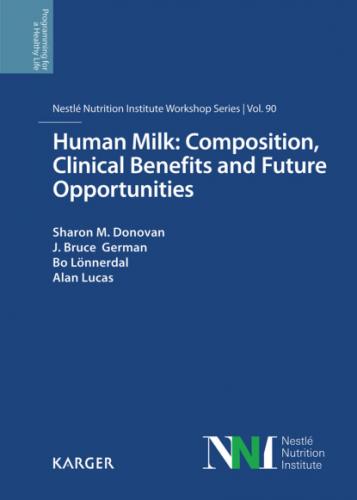Human Milk: Composition, Clinical Benefits and Future Opportunities. Группа авторов
and function. This workshop provided a venue in which to consider human milk and lactation from multiple perspectives, highlighting what we know, what we do not know and promising avenues for future research. It is clear that human milk is more than the sum of its isolated chemical components. Due to the importance of breastfeeding to child health, the application of state-of-the-art analytical approaches to interrogate the complex structure of human milk and its effects on the recipient infant should be a high priority in pediatric research.
Sharon M. Donovan
J. Bruce German
Bo Lönnerdal
Alan Lucas
Human milk presents the optimal nutrition for infants and is key to sustaining health and building the foundation for growth and cognitive development. The World Health Organization (WHO) recommends that infants should be exclusively breastfed for the first 6 months of life and subsequently receive suitable complementary foods while breastfeeding continues up to 24 months of age or beyond.
The global initiative to encourage breastfeeding for all infants worldwide represents one of the most significant public health interventions. It is therefore critical that any guidance to support breastfeeding is evidence-based.
Rapidly advancing technology has allowed us a closer look at the different components of human milk and shed light on their biological effects on growth, metabolism, cognition, and immunity. This new knowledge is constantly enriching our picture of how human milk sets the foundation for health in later life. Yet, researchers face many challenges in their quest to unravel its complexities. An understanding of human milk is inextricably linked to an understanding of the biology of the growing infant. Any clinical study that aims to elucidate the effects of a specific element in human milk must overcome the double hurdle of design and outcome: how can we test such a complex substance or extract a meaningful endpoint from the intricacies of infant development? Success relies in part on obtaining a cohesive body of in vitro, in vivo, and clinical data.
The 90th Nestlé Nutrition Institute Workshop brought together the world’s experts on human milk, chaired by Prof. Sharon M. Donovan (Professor and Melissa M. Noel Endowed Chair in Nutrition and Health, Department of Food Science and Human Nutrition, Carl R. Woese Institute for Genomic Biology, University of Illinois), Prof. J. Bruce German (Director, Foods for Health Institute, University of California, Davis), Prof. Bo Lönnerdal (Distinguished Professor Emeritus, Department of Nutrition and Internal Medicine, University of California, Davis), and Prof. Alan Lucas (MRC Clinical Research Professor and Head of the Childhood Nutrition Centre, Institute of Child Health, University College London). The four sessions in the workshop touched on the full spectrum of our knowledge of human milk, from the history and mechanics of breastfeeding, its physiological effects, to the new surprises revealed by metabolomics and comparative biology.
Although it is well accepted that the early years of a child’s life are critical for growth and development, we have little mechanistic understanding of how the infant diet shapes short-term and long-term health. One of the key learnings in this workshop is that human milk is not only a source of essential nutrients, but also contains a variety of bioactive substances. These include essential microbes, long-chain fatty acids, complex oligosaccharides, nucleotides, and bioactive signaling proteins and hormones.
We are only just beginning to glimpse at how these components protect against infections, regulate infant development, and modulate long-term out-comes. A deeper understanding of the function of human milk will also help to enhance outcomes in vulnerable populations, including premature infants, those with low birthweight, and infants with special dietary needs.
We would like to thank the four Chairpersons Sharon M. Donovan, J. Bruce German, Bo Lönnerdal, and Alan Lucas for putting the scientific program together.
We also would like to thank all speakers and scientific experts in the audience, who have contributed to the workshop content and scientific discussions. Finally, we thank Christine Stillhart and the NNI teams for their logistic support.
Dr. Natalia Wagemans
Head of Nestlé Nutrition Institute
La Tour-de-Peilz, Switzerland
Chairpersons & Speakers
Prof. Lindsay H. Allen
Western Human Nutrition Research Center, Department of Nutrition University of California, Davis 430 W. Health Sciences Drive Davis, CA95616
USA
E-Mail [email protected]
Prof. Lars Bode
Division of Neonatology and Division of Gastroenterology and Nutrition, University of California, San Diego, 9500 Gilman Drive – MC0715 La Jolla, CA 92093
USA
E-Mail [email protected]
Prof. Sharon M. Donovan
Department of Food Science and Human Nutrition Carl R. Woese Institute for Genomic Biology, University of Illinois 339 Bevier Hall, 905 S. Goodwin Avenue Urbana, IL 61801
USA
E-Mail [email protected]
Prof. J. Bruce German
Food Science and Technology University of California, Davis RMI North Building 1 Shields Avenue Davis, CA 95616
USA
E-Mail [email protected]
Prof. Ferdinand Haschke
Paracelsus Medical University Salzburg and Medical University Vienna Währinger Gürtel 18–20 AT–1090 Vienna
Austria
E-Mail [email protected]
Prof. Olle Hernell
Pediatrics, Department of Clinical Sciences Umeå University SE–901 85 Umeå
Sweden
E-Mail [email protected]
Prof. Erika Isolauri
Department of Pediatrics and Adolescent Medicine Turku University Hospital Kiinamyllynkatu 4–8 FI–20520 Turku
Finland
E-Mail [email protected]
Prof. Weili Lin
Biomedical Research Imaging Center CB#7513 University of North Carolina at Chapel Hill, Chapel Hill, NC 27599
USA
E-Mail [email protected]
Prof. Bo Lönnerdal
Department of Nutrition University of California, Davis 3217C Meyer Hall One Shields Avenue Davis, CA 95616
USA
E-Mail [email protected]
Prof. Alan Lucas
Institute of Child Health
